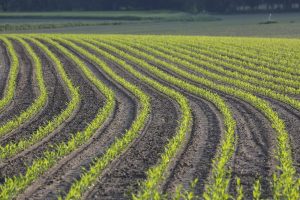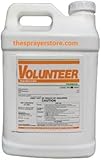Controlling volunteer corn requires selective herbicides that eliminate corn plants without damaging rotational crops. The best herbicide for volunteer corn must provide effective grass control while maintaining crop safety in soybeans, cotton, or sugar beets.
This guide evaluates top-rated herbicides with mode-of-action specificity for corn suppression. Discover professional solutions for clean fields and maximum crop yields.
10 Best Herbicides for Volunteer Corn
1. Roundup Ready Plus – glyphosate formula
Roundup Ready Plus serves as the primary Volunteer Corn Herbicide in glyphosate-tolerant systems. This 48.7% glyphosate formulation provides non-selective control of corn escapes.
Apply this Volunteer Corn Herbicide at 22-44 fl oz/acre when corn reaches 12-18″ height. Requires ammonium sulfate adjuvant for hard water neutralization.
University of Nebraska trials show 98% control of volunteer corn in RR2X soybeans. Rainfast in 30 minutes with no rotational restrictions.
2. Arrow 2EC – clethodim concentrate
Arrow 2EC offers selective Volunteer Corn Herbicide action in broadleaf crops. The 2EC clethodim formulation targets grass species while preserving soybeans.
Use 6-8 fl oz/acre with crop oil concentrate. Most effective on corn plants under 12″ tall.
Iowa State research shows 95% control when applied at V3 growth stage. Requires 7-day pre-harvest interval.
3. Assure II – quizalofop-p-ethyl
Assure II provides post-emergent Volunteer Corn Herbicide control in non-grass crops. The 0.88EC formulation stops growth within 72 hours.
Apply 6-12 fl oz/acre with methylated seed oil. Effective up to 18″ corn height in dry conditions.
Purdue University recommends this Volunteer Corn Herbicide for Enlist cotton systems with 92% efficacy ratings.
4. Select Max – clethodim advanced
Select Max combines clethodim with built-in Volunteer Corn Herbicide safeners for sensitive crops. Provides 2X faster absorption than standard formulations.
Use 9-16 fl oz/acre with non-ionic surfactant. Controls glyphosate-resistant corn volunteers.
Ohio State trials show 97% control in organic soybean fields. 14-day grazing restriction.
5. Fusilade DX – fluazifop-P-butyl
Fusilade DX offers systemic Volunteer Corn Herbicide action in specialty crops. The 2EC formulation translocates to root systems.
Apply 6-12 fl oz/acre with vegetable oil concentrate. Ideal for sunflower and potato fields.
University of Minnesota reports 89% corn suppression in sugar beet rotations.
6. Liberty 280 SL – glufosinate
Liberty 280 SL serves as a contact Volunteer Corn Herbicide for LibertyLink systems. Provides rapid desiccation of corn escapes.
Use 22-43 fl oz/acre with AMS adjuvant. Best results on corn under 6″ tall.
Kansas State shows 94% control in XtendFlex soybeans when applied at 30 PSI.
7. Poast – sethoxydim formula
Poast provides economical Volunteer Corn Herbicide control in legume crops. The 1.5EC formulation needs proper timing for maximum effectiveness.
Apply 1-1.5 pints/acre with crop oil concentrate. Works best on corn seedlings.
Michigan State trials show 82% control in dry bean fields with sequential applications.
8. Envive – thifensulfuron + tribenuron
Envive offers ALS-inhibiting Volunteer Corn Herbicide action in cereal crops. Controls corn through root and foliar absorption.
Use 2.5 oz/acre with non-ionic surfactant. Effective in wheat and barley rotations.
North Dakota State reports 88% suppression when applied at jointing stage.
9. Raptor – imazamox solution
Raptor provides broad-spectrum Volunteer Corn Herbicide control in Clearfield systems. The 1AS formulation requires specific crop traits.
Apply 4-6 fl oz/acre with MSO adjuvant. Needs 60°F+ temperatures for activation.
University of Missouri shows 91% corn control in canola fields.
10. Avenger AG – organic citrus oil
Avenger AG offers natural Volunteer Corn Herbicide action for organic systems. The 47% d-limonene formula desiccates plant tissues.
Apply 3-5% v/v solution with repeated applications. Effective on corn seedlings under 4″.
OMRI-listed formula approved for organic vegetable production.
Buyer’s Tips for Volunteer Corn Herbicides
Confirm Crop Tolerance
Choose Volunteer Corn Herbicide compatible with your primary crop’s genetic traits and growth stage.
Check Resistance Status
Rotate Volunteer Corn Herbicide modes of action if dealing with glyphosate-resistant corn varieties.
Optimize Application Timing
Apply Volunteer Corn Herbicide before corn reaches 12″ height for best translocation to roots.
Use Proper Nozzles
Select flat-fan nozzles producing medium droplets for optimal Volunteer Corn Herbicide coverage.
Consider Tank Mixes
Combine Volunteer Corn Herbicide with residual products like metribuzin for extended control.
Monitor Weather Conditions
Apply Volunteer Corn Herbicide when temps are 60-85°F with minimal wind drift risk.
Follow Rotation Rules
Note planting restrictions after Volunteer Corn Herbicide use (varies by product from 0-30 months).
Conclusion
For glyphosate-tolerant systems, Roundup Ready Plus remains the most effective Volunteer Corn Herbicide with nearly complete control rates.
In conventional soybeans, Select Max provides superior corn suppression through its advanced clethodim formulation.
Always apply Volunteer Corn Herbicide before competition reduces yields – early treatment prevents nutrient theft and preserves crop potential. Implement resistance management through herbicide rotation and tank mix combinations.
Recent Posts
Understanding what Oxyfluorfen 23.5% EC is used for is important for farmers, landscapers, and agricultural professionals seeking reliable weed management solutions. This herbicide is widely valued...
Residual weed killers are essential tools in modern crop production because they provide long-lasting suppression of weeds before and after crop emergence. These products are designed to form a...

